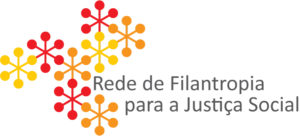 The article published on this blog yesterday highlighted the lack of grantmaking as a key challenge for the Brazilian philanthropy sector – and for the development of civil society in the country. One positive development in this regard is the emergence of the Philanthropy Network for Social Justice as a strategic actor in the grantmaking field. The funds and community foundations that make it up represent an effective alternative for financing and strengthening small and medium-sized organizations and movements operating in the field of rights.
The article published on this blog yesterday highlighted the lack of grantmaking as a key challenge for the Brazilian philanthropy sector – and for the development of civil society in the country. One positive development in this regard is the emergence of the Philanthropy Network for Social Justice as a strategic actor in the grantmaking field. The funds and community foundations that make it up represent an effective alternative for financing and strengthening small and medium-sized organizations and movements operating in the field of rights.
Through diversified grantmaking strategies, network member organizations promote democratic access to financial resources in distant and ‘peripheral’ geographic areas, involving populations that are marginalized (and often criminalized) when it comes to their access to rights. Together they have the capacity to support strategic causes, understand what is happening, and offer fast responses to urgent needs. Supporting civil society organizations and social movements is a crucial strategy for strengthening Brazilian civil society, and democracy. Promoting access to rights – having the right to rights – is the fundamental point of departure for the consolidation of democracy.
The funds and foundations that are part of the Philanthropy Network for Social Justice began to emerge during the 2000s (with the exception of the Ecumenical Service Coordination – CESE, founded in the 1970s) with the purpose of supporting NGOs and social movements in the country. The context was the withdrawal of international financing, and mobilizing local resources continues to be a major issue: 70 per cent of the resources of network organizations originate from international philanthropy. Although recently certain members have strengthened bonds with government and with corporate philanthropy or directly with companies, the mobilization of local resources to support civil society is still a major challenge.
The network members
Network members have the following characteristics in common: they work in the field of social justice and/or community philanthropy; they mobilize and donate resources to support civil society initiatives in different thematic and geographic areas, serving different groups; they want to transform the Brazilian social reality and reduce the major social inequalities and inequalities related to access to rights.
The network is currently made up of ten organizations, seven funds and three community foundations:
- Baobá Fund for Racial Equality
- Elas Social Fund – focused exclusively on promoting leadership among girls and women
- Brazil Human Rights Fund, which works to promote human rights in Brazil
- Casa Social-Environmental Fund, which promotes environmental conservation and sustainability
- PositHIVo Fund, which works to prevent STDs/AIDS, offers assistance to HIV-positive individuals and fights stigma
- CESE, which works to promote, defend and guarantee rights
- iCS (Climate and Society Institute), which promotes prosperity and justice and the development of low-carbon initiatives
- ICOM (Community Institute of Greater Florianópolis), which supports community and institutional development in Florianópolis
- Baixada Maranhense Institute, which supports social and production projects in the Baixada Maranhense area
- Tabôa, which supports grassroots initiatives and social-economic ventures in the district of Serra Grande, Uruçuca/BA, and in communities located near the Serra do Conduru State Park (PESC)
How they work
The grantmaking methods used by network organizations are diverse. The majority use calls for proposals for their projects, but some also donate resources in response to proposals received via continuous application processes and/or based on specific demands, meeting the urgent needs of civil society organizations, movements, activists and/or defenders of rights (such as, for example, for events and strategic conferences).
Certainly, there is a big difference between network members and northern grantmakers in terms of how they operate. Network members are anchored in the Brazilian and Latin American social-political context, with in-depth knowledge of the realities and geographic nuances. They have a strong capacity to coordinate, to understand specific demands, and to offer an immediate response to the needs of groups, collectives and local movements.
This is undoubtedly one of the most marked characteristics of network organizations, and it is for this reason that they cannot be understood as ‘intermediary funds’. Deconstructing this issue is absolutely vital. While the great majority of funds and community foundations mobilize resources with international foundations, they should be seen as the partners of these large donating foundations rather than working on their behalf, with the capacity to defend causes and become involved in complementary activities developed by them beyond their grantmaking programmes.
Significance of their activities
Based on information collected through different surveys, between the years 2000 and 2017 member organizations directly donated a total of R$146,895,761 (approximately US$41,970,217) to 10,669 NGOs and social movements in Brazil. This shows how significant the network’s activities are in terms of the reach and volume of the resources donated to support initiatives in the field of human rights and social justice.
Given this reach, the network should be viewed as a ‘network of networks’, bringing together a range of different actors: NGOs, movements, funders, public authorities, national and international networks, etc.
It is important to emphasize that member organizations’ work is significant not only in terms of the resources mobilized and donated and the projects supported but also in terms of the results achieved. According to an internal survey conducted in 2013, 80 per cent of network organizations base their actions on models and theories of social change. All of them carry out capacity development (indirect donations) and use monitoring and evaluation systems that allow for systematic information on the efficiency and effectiveness of the activities they support.
Future plans
In the coming years, the network will work to strengthen and expand its activities by forming better partnerships and by adding new members. We are aware of several initiatives in the field of social justice and community philanthropy that could be integrated in order to effectively strengthen the network and help us to achieve our goals.
We also attach great importance to the production and dissemination of knowledge, both through the publication of articles and by conducting studies, surveys and research. One example relates to the field of grantmaking in Brazil. We need to gain a more in-depth understanding of the scope, reach and results of initiatives focused on supporting and strengthening the activities of NGOs and social movements.
Another strategic area is strengthening community philanthropy in order to give more visibility to its activities and to initiatives focused on leveraging community development and the sustainability of grassroots civil society organizations. Attracting new actors and social investors to this area is also important.
Finally, we will aim both to organize more local events and to strengthen the network’s presence in international forums. If we can expand the network, diversify its activities, make it more visible, and enter into dialogues with different stakeholders, the network can become an inspiring reference not only in Brazil but also in Latin America, and more widely in the Global South.
You can read both this post and the article published yesterday ‘Philanthropy in Brazil: Obstacles, challenges and opportunities’ in Portuguese by clicking here.
Graciela Hopstein is the executive coordinator of the Brazilian Philanthropy Network for Social Justice.